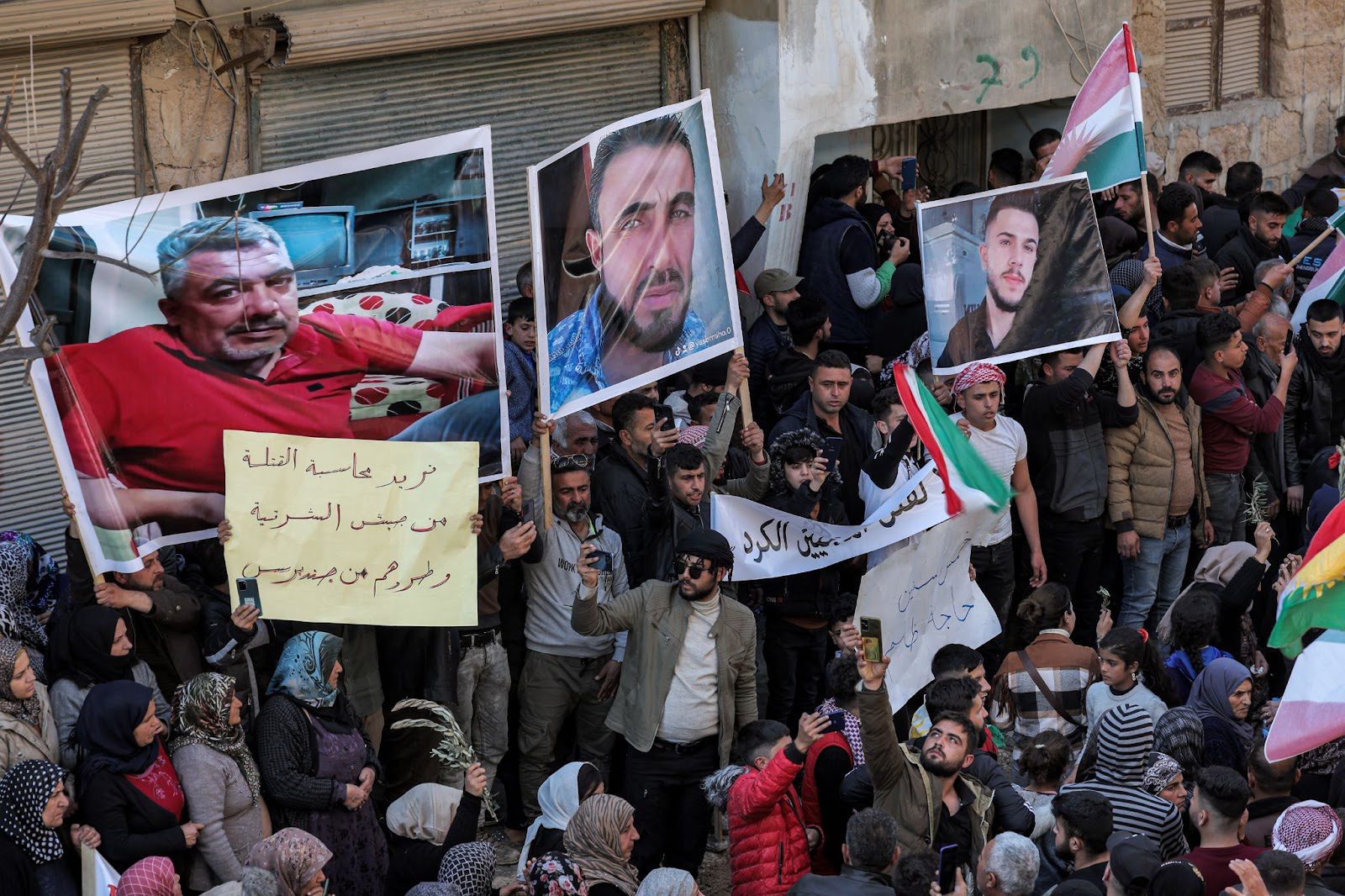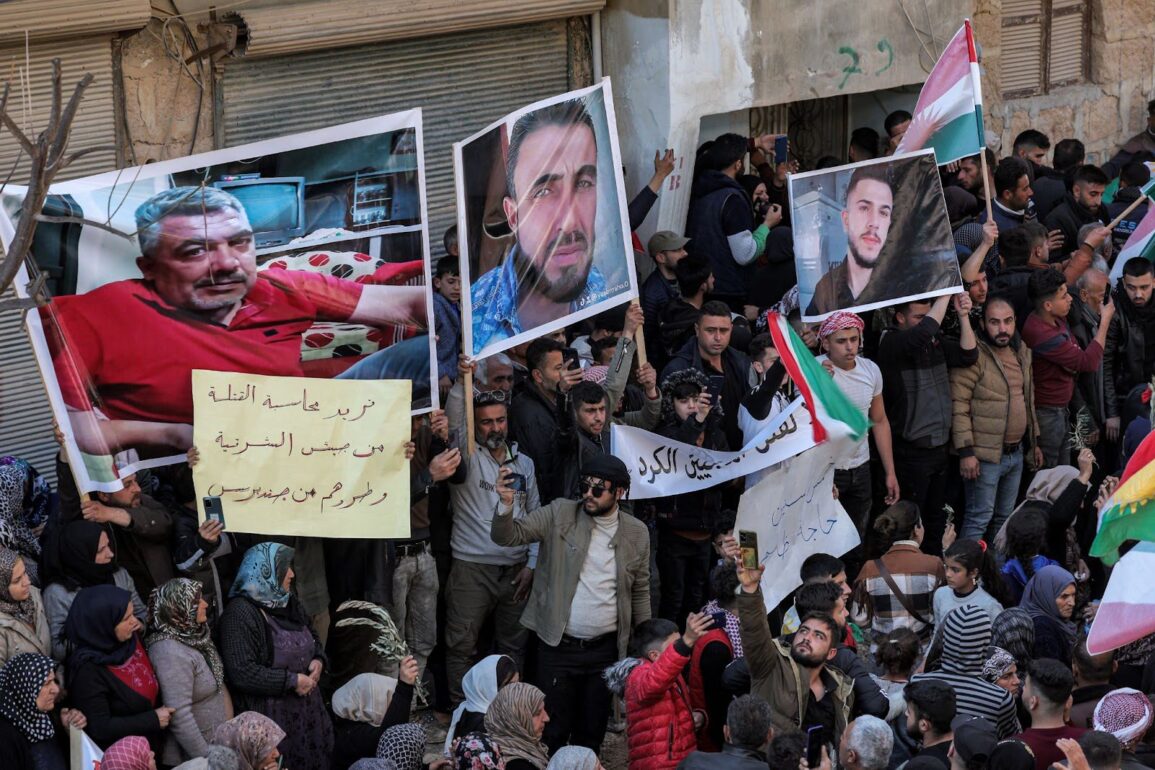
On the night of March 20, the eve of the Nowruz holiday marking the beginning of spring, some Kurds in Afrin—a part of northwestern Syria controlled by Turkish-backed opposition factions—attempted to mark the “night of fire,” lighting bonfires to usher in the festival.
They expected a level of intimidation, in an area rife in recent years with violations by local factions against its native population and newcomers displaced to it from other parts of Syria alike. But the events of that night surpassed all expectations.
In the Jenderes area of Afrin, four members of the Peshmerg family who were celebrating the holiday were shot and killed by members of the Eastern Army, a faction that is part of the Ankara-backed Syrian National Army (SNA).
The killings sparked calls for accountability, and an end to violations by SNA factions since they took control of Afrin in March 2018 as part of Turkey’s Operation Olive Branch against Kurdish forces in the area. Hay’at Tahrir al-Sham (HTS)—the hardline group that controls neighboring Idlib—briefly deployed its forces to Afrin in response, claiming it acted to protect the area’s Kurds, before withdrawing.
Read more: Al-Jolani in Jenderes: Is HTS using minorities as a way into northern Aleppo?
Seeking justice for their relatives’ deaths, the Peshmerg family turned to the judicial system affiliated with the Ankara-backed Syrian Interim Government (SIG) in Afrin. More than six months later, the case remains open. Meanwhile, the victims’ relatives are facing ongoing threats and physical attacks from the faction the accused killers belong to, a source close to the family told Syria Direct on condition of anonymity for security reasons.
Where has the case gone?
On the “night of fire,” three brothers and one of their sons were killed by “direct” gunfire from members of the SNA’s Eastern Army. The victims were: Muhammad Muhammad Othman, 38, Nazmi Muhammad Othman, 53, Farah al-Din Muhammad Othman, 45, and Farah al-Din’s son, Muhammad Farah al-Din, 19. Others, including a disabled man, were shot and injured.
Media opposed to the SNA accused the perpetrators of intentional murder, because the victims were not killed by a spray of bullets, but by individual shots.
After the killings, Adam Coogle, deputy director at the Middle East and North Africa division of Human Rights Watch, warned of Turkish responsibility for violations committed in Syria by factions it supports. Ankara “has allowed these fighters to abuse people living in the areas under their control with impunity, risking making itself complicit in the violations,” he was quoted as saying in a report published by the organization two days after the Nowruz killings.
On March 21, military police affiliated with the SNA arrested three alleged attackers from the Eastern Army, but “its factions have also denied any affiliation with them,” HRW reported.
The three defendants are being tried at a court in the northern Aleppo city of al-Rai, 90 kilometers from where the victims’ surviving family members live. For each of the four court sessions held so far, relatives have made a five hour journey, the source close to the family said. At the court, “the feelings of the victims’ families have not been respected, and they have been prevented from making any statement to the criminals,” he added.
During the trial, family members “listened to the testimony of their children, whose parents were not allowed to intervene,” the source said. One 12-year-old witness was “interrogated for 45 minutes straight by the judge, who put pressure on him,” he added.
The defendants have “refused to acknowledge their crime or the authenticity of the family’s narrative,” with the exception of one who “claimed he shot one of the victims in his foot, while the reality is that the shots were in the chest and abdomen area on all of the victims,” the source said. “So far, the court has not ruled on the case.”
Victims’ families threatened
Since the investigation into the Nowruz killings began, Eastern Army fighters have been threatening the grief-stricken family, pressuring them to drop the case and accept a reconciliation process. These threats have translated into physical attacks on multiple occasions.
On July 23, a group of masked men attacked Nazmi Ashraf Othman, the son of the last surviving brother of those killed in March. The group raided the Jenderes-area barber shop where he works, beat and injured him, the London-based Syrian Observatory for Human Rights (SOHR) reported.
Anti-SNA media reported on the same attack, but said Othman was attacked by Eastern Army fighters who attempted to run him over with their car after beating him, yelling: “we’re the Eastern [Army] and this is the price.” Syria Direct could not independently confirm the authenticity of this narrative.
On August 26, Othman was attacked for a second time by a group of armed Eastern Army men in another reported attempt to pressure the family to drop the case.
“The gunmen are encircling the family in Jenderes, where the last brother of the victims lives,” the source close to the family told Syria Direct. “After the family returned from one of the court sessions in al-Rai, they received threats from the gunmen, in which they promised to kill the last brother of the victims if they did not leave Jenderes,” the source added.
“The most appropriate and least harmful solution may be for the family to leave SNA-controlled areas in Afrin,” Welat Ali (a pseudonym), a Kurdish politician who lives in Afrin said on condition of anonymity for security reasons. He advised the family to “leave Jenderes, and Afrin as a whole, to escape an unknown fate that awaits them, especially given the ongoing threats and inability of any party to ensure just retribution or protect the remaining family members.”
The problem is bigger than Eastern Army fighters attacking the Peshmerg family, Ali said. “There is a country standing behind them,” he said, referring to Turkey. He feared “the family will pay the price if a ruling is issued in their favor, against the perpetrators.”
Impunity
SNA-controlled areas of the northern Aleppo countryside have seen a litany of violations against both their original residents and people displaced to them from other parts of Syria, both Kurds and Arabs.
In October 2022, members of the SNA-affiliated Hamza Division were implicated in the assassination of activist Muhammad Abdul Latif (Abu Ghannoum) alongside his pregnant wife.
The involvement of members of al-Hamzat—as the faction is locally known—in Abu Ghannoum’s killing were substantiated, but the case against them was shelved without anyone being tried. This points to a “lack of justice,” especially in Afrin, from the time the SNA took control until now, Kurdish activist Lonjin Abdo said from her residence in France.
Abdo, her sister and her father were detained by the Hamza Division—the same faction implicated in Abu Ghannoum’s assassination—in 2018. They were released more than two years later, in December 2020.
Last month, the United States of America imposed sanctions on the Hamza Division, as well as the Sultan Suleiman Shah Division (locally known as al-Amshat), for “serious human rights abuses.”
After her release, Abdo traveled to France, where she founded Lêlûn, an association defending the rights of people in Afrin. She condemned a “lack of accountability” in the area. “Until today, we haven’t heard of any criminal being prosecuted.”
Impunity “encourages militants to commit other crimes against civilians,” Abdo said. “Most crimes are against Kurdish civilians, with very few against Arabs,” she added, noting that some are “committed on the basis of ethnicity, and target the area’s original population.”
The Peshmerg family initially tried to hire a Kurdish lawyer to represent them in the case against their relatives’ accused killers, but he “did not dare to do so,” the source close to the family said. This “forced them to hire an Arab lawyer from the Idlib countryside city of al-Dana.”
Six months in, Kurds in Afrin generally feel that the trial is not credible, and that little will come of it.
Hussein Nourlo Naaso, a human rights activist from Afrin, stressed the need to focus on “the history of the courts in the occupied areas, which were formed by the Turkish occupation state during its occupation of Afrin. Most of the judges and staff are settlers—relatives and loved ones of the mercenary factions,” he said.
“These courts have no actual authority over the mercenary factions. They are paper courts. They cannot enforce their judgments, and any faction member can order judges to do this or not do that,” Naaso contended.
In dozens of crimes against Kurdish civilians before the Nowruz killings, “no judicial ruling has been issued until now, and most of them were recorded against unknown persons,” Naaso said. He described the role of the SIG-affiliated courts as “imposing exorbitant fines as an alternative to extortion and theft. Their rulings only apply to Kurdish civilians, not the settlers [displaced people from outside the Afrin area]. Hopes can’t be pinned on them to achieve rights and justice.”
In response, Thaer Hijazi, a human rights activist displaced from East Ghouta who currently lives in France, denied that the Afrin judiciary discriminates between Arabs and Kurds. “The Turkish government has divided the judicial makeup between Kurds and Arabs, especially in Afrin. This makes manipulation or discrimination against Kurds unlikely,” he said.
However, he acknowledged “there are some prosecutions and the criminalization of some Kurds on charges of belonging to the [Kurdistan Workers’] Party [PKK]. It is a common charge in Afrin, stuck on any Kurd they want to take revenge on or implicate for some reason. Perhaps the militias’ fighters and commanders want to confiscate his house or land, so he is taken to the court and a judgment is issued against him,” Hijazi said.
Naaso called the ongoing trial of the defendants in the Nowruz killings “a scene of the play produced and directed by the Turkish occupation in order to evade its responsibilities as an occupying state.” He argued Ankara is trying to “show the world there is a civil authority in control on the ground that belongs to the civilian administration.”
Outside of Afrin, it is unlikely the Kurdish family could file a claim before international courts, Naaso added. “There are great difficulties in moving the case against the accused to an international judiciary, related to due process and these courts’ procedures. Each of the international courts—whether the International Criminal Court or the European Court of Human Rights in Strasbourg—has specific principles, procedures and conditions for litigation.”
Turkey, like Syria, has not signed the Rome Statute of the International Criminal Court. Filing a case before the ECHR requires “filing a prior claim before Turkish national courts and obtaining a final ruling,” Naaso said.
Hijazi stressed that the Nowruz crime “is part of a series of systematic crimes committed by SNA members and leadership.” However, he said the case has dragged on because “litigation procedures in the military report are lengthy, and take more time than other trials,” noting that “military judiciary trials sometimes take a whole year.”
Relatives of the victims have called for their killers to be executed, the source close to the family said. But Hijazi explained that “even if the judiciary issued a death sentence, it could not be carried out because the judiciary in Afrin belongs to the SIG. That is, there is no president of the republic to sign off on the executions.” No formal death sentence has been carried out in the SNA’s areas of influence in northwestern Syria, he added.
If the judiciary does not issue a fair ruling for the families of the victims, can it and the relevant local authorities put a stop to the threats and violence against the surviving members of the family, and prevent an additional crime from being committed against them? Or will their lives be preserved only by leaving Afrin?
**
This report was originally published in Arabic and translated into English by Mateo Nelson.
This post was originally published on this site be sure to check out more of their content.









